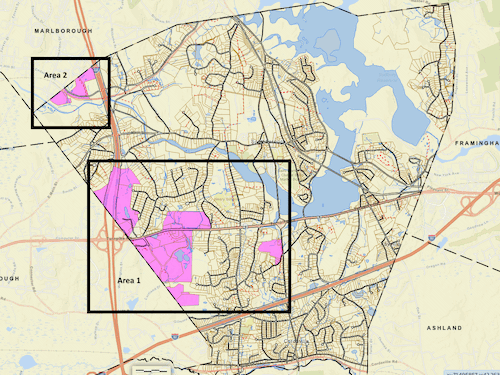Above: Planning members worry that voters will worry about potential future projects if zoning changes at Industrial Park zones beyond the old EMC parcel. (images edited from Town’s GIS Map)
The Planning Board has scheduled an additional hearing for this Monday to deal with a challenging, but highly desired, zoning Article. The Select Board is eager for Fall Town Meeting voters to approve an Industrial Park zoning use that will allow permitting and construction of a project at 21 Coslin Drive.
The new use would create a special permitted use for Highway Major Retail, a:
retail sales and services facility containing no less than 50,000 gross square feet devoted to the retail sale to an end user of goods and services, including, but not limited to: traditional grocery store items (which may or may not be sold under its own brand) that contain a range of food products that are fresh, packaged or prepared (excluding storage) household goods, optical goods and services, pharmacy goods and services, liquor, automotive parts and repair, food service and fueling stations
Both boards hope that Atlantic Management’s proposed project will generate much needed revenue for the Town. The problem is that the developer’s proposal wasn’t for an “overlay” zone that would restrict the new use to just their parcel, or even the area of the old EMC campus. It would also apply to other lots across town zoned for Industrial Park uses. (See maps below.)
Some members of Planning, and the public, publicly worried about how abutters to other IP properties will react. They warned that residents concerned about the impact on their back yard could derail the vote, which needs 2/3 approval to pass. Members were especially concerned about one “touchy” parcel – the property at Park Central.
Representatives for Atlantic Management pitched that they wrote the zoning with requirements and restrictions that essentially make their parcel the only viable property. That includes the caveat:
The Lot does not abut any residential zoning district nor is it located within 500 feet of a residential district boundary
Planning Board Vice Chair Marnie Hoolahan referred to the large property at Park Central as an example that could be a problem. She pointed out that while the property is currently abutting a residential district, the owner could split the lot into multiple parcels, and apply for a permit on a smaller parcel that no longer abuts residential districts.
Hoolahan confirmed she was referring to the abutter’s ability to use an ANR (Approval Not Required) application to split the lot. (Atlantic Management’s attorney Robert Buckley wondered if the property had the required “frontage” on streets to allow that. That wasn’t confirmed in the meeting.)
Buckley stressed that the new use still requires a special permit. But members of the Planning Board highlighted that once zoning is approved, permit approval is through the “appointed” Zoning Board of Appeals, and would be out of the hands of the “elected” Planning Board and Town Meeting voters.
Hoolahan and member Debbie DeMuria stressed their concern that voters who aren’t even aware of the proposed changes yet would be upset about the process and perceived risks. They were enthusiastic about the planned project. But they warned the current zoning strategy was likely to fail. They urged pursuing an overlay to “spot” zone the parcel.
Public commenter Kristen Lavault agreed that abutters concerns, especially over the Park Central parcel, would tank the zoning effort.
Buckly argued that approving a new zoning map and the overlay is complicated and time consuming. He worried that changing course would prevent them from meeting the timeline for getting the zoning on the Warrant for the upcoming Special Town Meeting on October 27th. He noted concerned that there are users/entities currently interested in doing something at the site, but a delay could mean they move on elsewhere.
Planning Member Lisa Braccio said that she was less “stuck” on the overlay than her colleagues were. She suggested adding language to only allow the use for a site that doesn’t have egress onto a “Scenic Road”. She believed that could “alleviate” residents’ concerns about potential impacts at sites like Park Central and Ken’s Foods.
Commenter Tim Litt indicated that he wasn’t a fan of the developer’s choice to “define their way into” what is essentially a spot zone. He recommended writing zoning that specifies what is wanted rather than attempting to create roadblocks for what it isn’t wanted. He also highlighted that Southborough’s Scenic Road laws are strange. They have been previously designated not based on characteristics, but by when they were adopted as public roads. The Planning Board recently tried to expand the list of roads and could try again in the future.
Planning Member Alan Belniak said that both Braccio and Litt had good points about the scenic roads. He suggested that a solution might be to word that the parcel doesn’t have egress on a scenic road “at the time of construction”.
Hoolahan and DeMuria still pushed for spot zoning as a better solution. Both noted that beyond worries about getting the Article passed, they didn’t like a developer writing zoning changes that impact the overall town.
Chair Meme Luttrell indicated she also would prefer spot zoning. But she didn’t want to oppose the Select Board’s request to bring the Article to Town Meeting. She wasn’t sure if Buckley was right in believing that switching to overlay zoning would require re-advertising for a new set of public hearings.
The board scheduled a follow up meeting to focus on the continued hearing this Monday evening, September 13th. They hope to have some answers from Town Counsel by then.
The agenda for the meeting has been posted. The board will meet over zoom at 6:30 pm. The Select Board has posted an agenda to allow participating in that meeting.
During the meeting, the board also held a hearing for other use changes to modernize the Industrial Park zone. They agreed that to avoid “muddying” the issue and confusing voters, they will push that Article to Annual Town Meeting this spring.
For the redlined, recently revised draft of the bylaw (which combined the two originally proposed Articles and incorporated changes suggested by Town Counsel), click here. For a reminder about the pitch Atlantic Management made to the Select Board, click here.
For more coverage of items headed to the Fall Town Meeting, click here.






The title of this alone is concerning considering nobody in town, abutters or residents have seen the by law. It’s even worse when you have developers threatening that if we don’t do it now then we will lose. Let’s not be stupid we don’t lose they do. The developer bought this parcel for a lot of money and if they don’t develop it they will be the ones in trouble. They should be negotiating with us not the other way around when it comes to their requested zoning changes. They’re also being so bold to change zoning for every parcel over night. Southboro is not desperate. Please don’t act like we are.
Jon
I must disagree. We are desperate.
For the last few years the tax burden has been shifting in the direction of residential properties. This means that the residential tax payer is seeing their property taxes rise faster that the overall cost of government and that cost is rising fast. The list of nice things we want is nearly endless but we need to be able to pay for them without taxing our most vulnerable residents out of town.
Our zoning ordinances are overly complex, too restrictive and woefully out of date. We have a reputation for being a difficult place to do business. This needs to change. We need to work with quality developers not treat them as pariahs. We need the tax revenue.
The area in question is already zoned for commercial and industrial development. My own estimate is that this development would generate between $300,000 and $400,000 in property tax revenue. That is enough money to pay for the police officers that the Chief wants or to make a significant dent in the debt service for a school building program.
This parcel has been under developed for decades. It is time that we stopped the knee jerk NO response to potential development and started looking at the big picture. We need to treat developers in this part of town as partners rather than the enemy.
It is time to focus on YES rather than NO.
I don’t disagree that we should update zoning on rt 9 and that it should carry the entire roadway. It shouldn’t be for blanket industrial parcels. Once you do this you lose any future ability to “Approval Not Required”. I disagree that we are going to allow developers to dictate the terms and give themselves whatever they want. We lose all of our ability to negotiate in the process. We have the ability to negotiate the terms now and and there is no downside in doing so. This is rushed for a reason and it’s because we lose. Don’t be short sighted 300k is nothing in the grand scheme of things. Why are we not discussing what the town needs to provide this parcel what they want for zoning? Here are a few examples. Funding for additional public safety, school improvements and land for a waste water treatmen plant. We aren’t desperate it’s a negotiation and if you’re not willing or unable to negotiate you should have someone else do it. People have their strong suits and I think we need to slow down and take Business 101.
Jon
My understanding is that the Planning Board has been negotiating some changes to the by law. More information will be available at the Planning Board meeting Monday night.
It is important when negotiating to understand how strong your hand is. If we want to see this area developed in the foreseeable future, our hand is not strong. We have been losing quality industrial and commercial developments and the tax dollars that go with them to Westborough, Northborough, and Marlborough for decades. This is a chance to reverse the trend but we have to have the courage to embrace change.
Make no mistake about it, this vote is a test. Atlantic has purchased 2 of the EMC properties which constitute about 15% of current or former EMC properties. You do not need to be a soothsayer to understand that they may well have designs on much of the balance. You can easily view this zoning by law as a test case to see if Southborough is the type of community they can work with. If not, these parcels are just a small part of their portfolio and they can move on to our neighbors.
To understand the breadth of their portfolio, ere is a link to their web site, https://atlanticmanagement.com/
All of Rt 9 only generates about $3.6 million in tax revenue a little over 5% of our budget. This is a testament to our failed zoning and development strategy. So $300K-$400k is a significant chunk of what Rt 9 provides now. If the EMC sites were fully developed with quality commercial and industrial developments the tax revenues from those parcels could rival the revenue generated by Rt. 9
Will it be all smooth sailing? No of course not but what we have been doing for the last few decades has not been working for us, we should embrace this opportunity.
I think where you see desperation I see opportunity. The other towns have competing box stores. We shouldn’t have developers write our zoning and blanket other parcels with it. This takes thought and consideration. I’m for providing the developer a path and negotiating an outcome. This seems very unorthodox and a bit lazy to let them write your zoning and apply it to their property and others in town. Not all parcels are the same and there could be major repercussion’s to rushing something as big as a zoning change without proper oversight being allowed on a per project basis. Are we going to allow anyone to write their own zoning on their property? I would expect that I can if you’re allowing them to do it.
Jon
Firstly, there will be oversight. The notion that adopting this by law will mean that it is the “Wild West” on this parcel does not hold water. There will still be a site plan review, adherence to building codes, sanitary codes, and other zoning codes.
So, why can’t we just take our time and follow the normal process of developing zoning ordinances? Well, first of all this process has been a failure. Doubling down on a failed process is not a recipe for success.
Secondly, if we take our sweet time and engage in a protracted re write of our zoning codes this opportunity will pass us by. The major tenant Costco wants to open a store in this area in the second half of 2027. If they can’t do it here they can, and likely will do it elsewhere. I believe they came to us as an alternative to Westborough and that Westborough would very much like to get them back. This is a competition. We can win or take ourselves of of the game by our action on the 27th.
This is a good deal for the Town of Southborough and we should embrace it.
You forgot that in addition to site plan review, there is a Special Permit required. My understanding is that means the board has the discretionary right to reject projects it deems aren’t good for the town.
It looks like the version that will be in the Warrant will also likely have limitations on which Industrial Park parcels the use can apply to and will put the special permit power under the authority of the Planning Board. (That’s based on revisions proposed in Monday night’s hearing. But before I write up a post covering that, I have to catch up on if there was any discussion in last night’s Select Board meeting!)
I attended the PB meeting and I’m glad we now have an elected board that is taking control of the process rather than allowing blanket zoning across all industrial areas. I believe the proposed Costco at this property could be a good fit, though I’m not sure if a full traffic impact study has been conducted. I can easily imagine challenges at the 495/Route 9 interchange as well as capacity issues with the turnaround at Madison Place.
That said, I don’t intend to continue debating this on a board that exists for our town officials to enforce policy collectively. My hope is that we establish comprehensive zoning for the entirety of Route 9 that works for the community as a whole, not just for individual parcels.
Southborough is a wonderful place to live precisely because it has not been overdeveloped. We now have an opportunity to plan responsibly and preserve what makes the town unique, instead of sacrificing it in the way some of our neighboring towns have. This is especially important given the growing perception that some of our leaders may be approaching these decisions from a place of desperation, rather than thoughtful long-term planning.
I’m wondering what you meant by “a board that exists for our town officials to enforce policy collectively.” However some officials hope to use this blog, I hope you don’t believe that the point of the comment section is to promote Town officials’ point of view.
I encourage debate in the comments – though I try to correct or clarify facts when I think it’s helpful.
I believe that it’s important for residents to argue and defend/explain their differing points of view. Sometimes it changes other readers’ (and voters’) minds. And sometimes it can lead to finding middle ground to the community’s benefit.
If the goal is to compete with Westborough in lowering tax rates through commercial development, it’s important to look carefully at what “success” has meant for Westborough residents. Despite having nearly twice the concentration of commercial property as Southborough (2024: Westborough 29.5% vs. Southborough 16.3%), Westborough’s overall tax rate is 18% higher than Southborough’s. In fact, its abundance of commercial development has left residents paying a tax rate higher than 95% of homeowners across Massachusetts.
If you truly want to lower residential tax rates through commercial development, follow the proven model used by the 78% of communities with significant commercial property: first adopt a split tax rate, and then expand the commercial tax base in a way that actually benefits residents.
Southborough’s financial situation is now being described as “desperate.” Yet our residential tax rate is already higher than that paid on 87% of residential property in the state. How can we be desperate under those conditions?
A major contributor is the choice to adopt a commercial and industrial tax policy different from what is used in 78% of Massachusetts communities. As a result, our commercial and industrial tax base enjoys a relative advantage: it pays a rate higher than just 28% of the commercial and industrial property in the state.
In other words, Southborough burdens homeowners with one of the highest residential rates in the Commonwealth, while giving businesses one of the lowest. This imbalance leaves us “desperate.”
If we aligned our tax policy with the majority of the state, Southborough could generate an additional $3 to $4 million in annual revenue from its commercial and industrial base—without raising their rate above the state average.
It took years for this miscalculation to create today’s situation. The recent rejection of a new school is just one major symptom of the financial pressure that resulted.
Correction : It is a tax policy used for 78% of the commercial and industrial property in the state, not 78 % of the communities. 78% of the industrial and commercial property is located in 30% of the communities in Massachusetts and they all have split rate tax policies. It is proof concentration of industrial and commercial development has not delivered on the promise of lower residential tax rates. If it had splitting the tax rate would not be a means of keeping residential tax rates under control.
Beth summarized this, per usual, very well. Although already stated, I want to ensure everyone is aware: this, in and of itself, is *not* a project. The warrant article is not for a Costco. It is to *re-zone* the land to *permit* uses like Costco, or other retail. It’d be unfortunate if Costco were to walk away, but if the land were re-zoned before that, then this opens the opportunity for other retail to consider the land. The re-zoning needs to happen first (and that’s 2/3 of the attendees at town meeting!), and then a potential suitor creates a development plan, and can go through the process of site plan approval, etc. Thus, they’d be subjected to board discussion, votes, and the like … including public commentary.
Also – “though I’m not sure if a full traffic impact study has been conducted” – of course it hasn’t! Again – this is not a project. This is a request to change zoning. If/when a project moves forward, a project of this size would require a traffic study, and I for one look forward to reviewing it (if we get to that point).
I looked back at my more recent post, and while that is in the sub-head and the caption, and indicated deep in the story, I didn’t clearly spell that out in the body of the story. I’ll make an edit to do that.
While it is absolutely correct that this article is not a project approval but simply a request to re-zone the parcel, I believe it is important to underscore the unique risks associated with the Park Central location, which is also being bundled into this zoning change. The parcel’s only access is via Flagg Road—a narrow country road that barely accommodates two-way traffic and also serves as the primary route for both our middle and elementary schools. This road already experiences heavy congestion during school hours, with buses, parent drop-offs, and children walking or biking. Any potential future retail development—whether Costco or another large-scale user—would inevitably introduce serious and unsustainable safety challenges.
I fully understand that traffic impacts cannot be formally analyzed until a specific development plan is submitted, at which point a full traffic study and review would be required. However, when deciding whether to permit large-scale retail use through rezoning, we must acknowledge that such uses could proceed under an “approval not required” designation. In effect, this zoning decision sets the stage for what types of development could occur, and those uses could significantly affect the entire north side of Southboro—particularly the safety of our children and broader community—given the single point of access via Flagg Road.
For these reasons, I strongly urge that potential traffic and safety implications remain at the forefront of this zoning discussion. Even if detailed studies and mitigation measures come later in the process, the community deserves clarity now on how future retail uses might impact this sensitive and vulnerable location.
Finally, I believe Park Central should be excluded from this rezoning proposal altogether. Instead, it should be designated as a residential zone with one-acre minimum lot sizes, consistent with the abutting neighborhoods. This approach would not only preserve the character of the area but also protect the safety and quality of life for the surrounding community.
It sounded like limiting the parcel to the old EMC area (or even fewer parcels on that site) was the plan. I’m hoping the draft will be available by late the week prior before the September 29th hearing so I can share it with readers in time to review prior to that meeting.